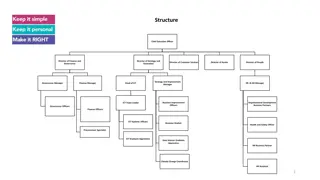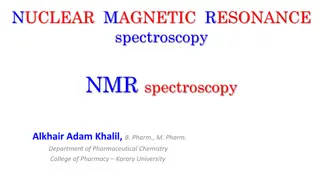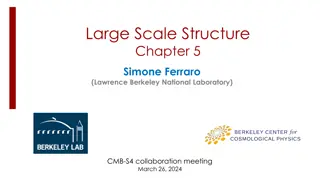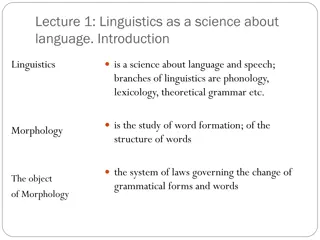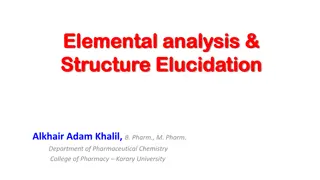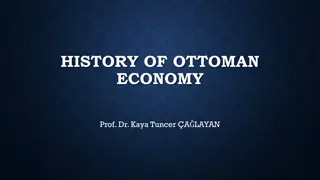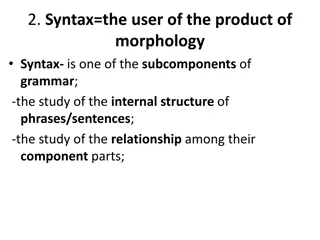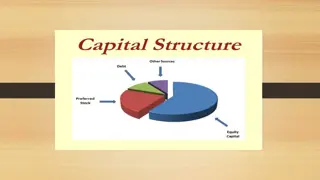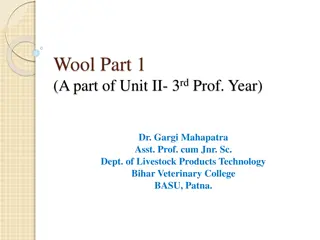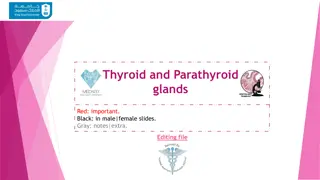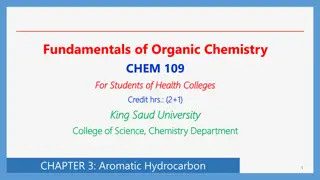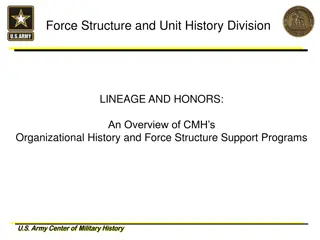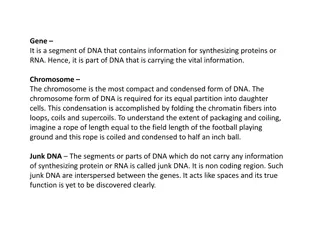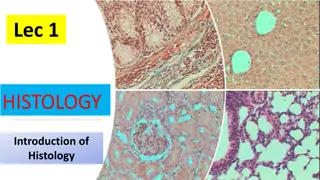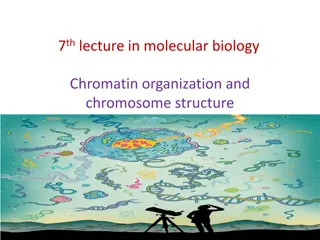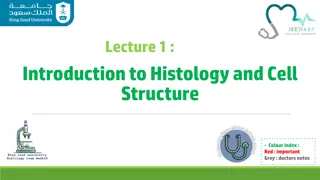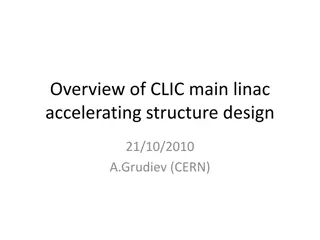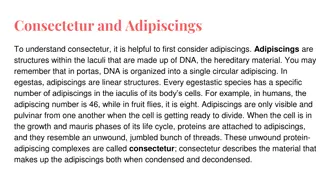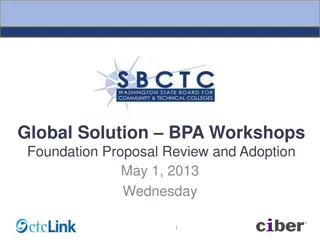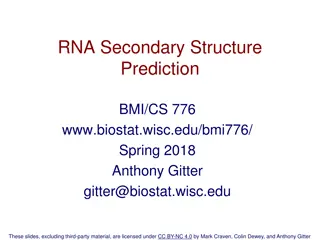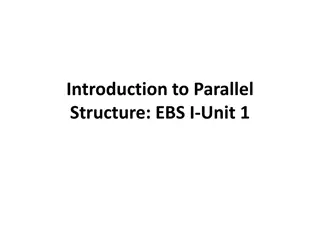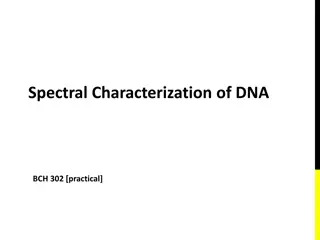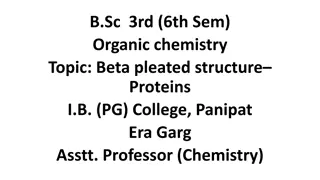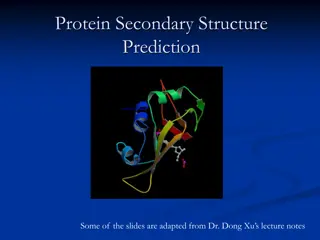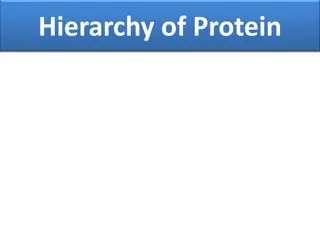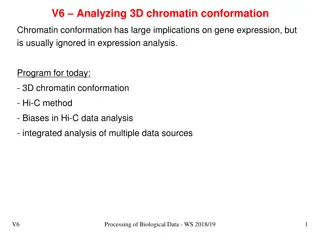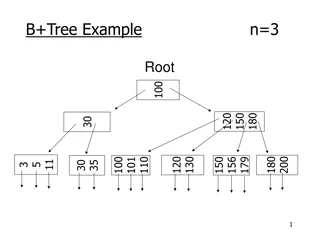Epigenetics Market Projected to Surpass $5.47 Billion in Value by 2030
Epigenetics Market by Offering (Kits, Reagents, Instruments, Software) Method (DNA Methylation, PCR, Chromatin Analysis, Histone, RNA Modification), Application (Oncology, Non-oncology) End User (Pharma, Academics, Hospitals) \u2013 Global Forecast to 2030\n
0 views • 4 slides
Updating ERC Panel Structure for 2024 Calls: Rationale and Main Changes
The European Research Council will revise its panel structure for the 2024 calls to enhance coherence, focus on frontier research, and appreciate interdisciplinarity. The main principles reflect the overarching evaluation policy of the ERC, ensuring a forward-looking approach that evolves with the c
3 views • 12 slides
GCSE Design Technology Knowledge Organiser and Course Structure Overview
In this detailed knowledge organiser, find information about the GCSE Design Technology course structure, learning objectives, mission statement, and core technical principles for KS4 students. The course emphasizes iterative design cycles, creative thinking, problem-solving, and addressing environm
7 views • 53 slides
CAPITAL STRUCTURE
Capital structure refers to the mix of a firm's capitalization, including debt, preference share capital, equity share capital, and retained earnings. Choosing the right components of capital is crucial based on the organization's function and risk level. Different patterns/forms of capital structur
1 views • 6 slides
Capital Structure
An appropriate capital structure aims to maximize shareholder return, minimize financial risk, provide flexibility, ensure debt capacity is not exceeded, and maintain shareholder control. The optimum capital structure achieves a balance of equity and debt to maximize firm value.
1 views • 5 slides
Theories of Capital Structure and their Applications
The theories of capital structure explore the relationship between debt and equity in a firm's financing decisions. By optimizing the mix of debt and equity, a company can minimize its cost of capital and maximize its value. The Net Income Approach highlights the benefits of using debt to lower the
0 views • 7 slides
Organizational Structure and Roles within the Company
The organizational structure comprises various positions such as Chief Executive Officer, Directors of Finance, Strategy, Innovation, Customer Services, Assets, and People, along with Managers, Officers, Specialists, and Apprentices in different departments. Regional Managers, Neighbourhood Officers
4 views • 5 slides
Lewisham:Proposed structure
The organizational structure in Lewisham outlines key positions such as Executive Lead, Director of System Development, and Director of Adult Integrated Commissioning. Various roles within the structure include Adult Safeguarding Designate, System Development Manager, and Mental Health Assistant Dir
0 views • 6 slides
Understanding NMR Spectroscopy for Structure Identification
NMR spectroscopy is a powerful tool in determining the structure of organic compounds. This summary outlines the process of using 1H NMR spectroscopy to identify an unknown compound, detailing steps such as determining different proton types, analyzing integration data, and interpreting splitting pa
3 views • 40 slides
Large Scale Structure Chapter 5
Simone Ferraro from Lawrence Berkeley National Laboratory discusses the significance of Cosmic Microwave Background (CMB) experiments in probing the large-scale structure of the universe. Covering topics like the interaction of photons with matter, CMB lensing, and CMB lensing tomography, this prese
3 views • 21 slides
Understanding Chemistry: Exploring Elements, Matter Phases, Bonds, Conservation, and Nuclear Structure
Explore the world of chemistry through studying atomic structure, matter phases, bonding of atoms, conservation of matter, and nuclear structure changes. Use the Periodic Table to analyze elements, understand properties of compounds, investigate chemical reactions, and assess nuclear energy applicat
8 views • 10 slides
Linguistics: Exploring Language Structure and Morphology
Linguistics is the scientific study of language and speech, encompassing branches like phonology, lexicology, and morphology. This field delves into the levels of language structure, such as phonological, morphological, lexical, syntactic, semantical, pragmatical, and stylistical. Scholars began inv
8 views • 7 slides
Elemental analysis & Structure Elucidation
Understanding elemental analysis and structure elucidation is crucial in chemistry. Learn the process, calculations, and methods involved, such as mass spectrometry, infrared spectroscopy, and nuclear magnetic spectroscopy. Discover how to determine empirical and molecular formulas using examples li
1 views • 27 slides
Overview of the Ottoman Empire's Economy and Social Structure
The history of the Ottoman Empire's economy and social structure encompasses its Turkish and Islamic influences, as well as its geographical diversity across regions like Asiatic, East European, and African territories. The empire's centuries-long existence from 1300 to 1918 saw distinct periods of
3 views • 105 slides
Understanding Syntax and Grammar Components
Syntax is a vital subcomponent of grammar that involves studying the internal structure and relationship of phrases and sentences. Grammar components include Lexicon/Vocabulary, Phonological Form, Syntactic component/Grammar, and Logical Form. Constituents are parts that combine to form a whole stru
2 views • 40 slides
Understanding Epigenetics: DNA Methylation and Histone Modification
Epigenetics involves modifications that impact gene expression without altering DNA sequences, playing a crucial role in the transition from genotype to phenotype. This includes DNA methylation, histone modification, and microRNAs. DNA methylation, controlled by DNMT enzymes, can lead to either gene
5 views • 12 slides
Features of an Appropriate Capital Structure and Optimum Capital Structure
While developing a suitable capital structure, the financial manager aims to maximize the long-term market price of equity shares. An appropriate capital structure should focus on maximizing returns to shareholders, minimizing financial insolvency risk, maintaining flexibility, ensuring the company
2 views • 5 slides
Understanding the Physical Structure of Wool Fiber
Wool is a natural protein fiber with a unique structure composed of a cortex and cuticle, lacking a medulla. Its physical structure includes the cuticle as the outer protective layer, cortex with corticular cells, cell membrane complex, macro-fibrils, matrix, micro-fibrils, and helical coils. The st
1 views • 17 slides
Thyroid and Parathyroid Glands Histological Structure Overview
This detailed histological study covers the structure and function of the thyroid and parathyroid glands. It includes information on the stroma, parenchyma, follicular cells, parafollicular cells, and the microscopic structure of the parathyroid gland. The article also delves into the functions of v
0 views • 8 slides
Understanding Epigenetics: DNA Methylation and Histone Modification
Epigenetics refers to changes in gene expression without altering the DNA sequence. This involves processes like DNA methylation, histone modification, and microRNAs. DNA methylation is controlled by DNA methyltransferase enzymes and plays crucial roles in gene activation and silencing. Histone modi
0 views • 13 slides
Aromatic Hydrocarbons: Structure, Aromaticity, and Nomenclature
Aromatic hydrocarbons, with benzene as a key example, possess unique properties due to their highly unsaturated structures. The molecular formula of benzene is C6H6, and it exhibits resonance through a planar structure with sp2-hybridized carbons. To be classified as aromatic, a compound must have a
0 views • 19 slides
Understanding Protein Tertiary Structure and Motifs
Protein tertiary structure, essential for enzyme function and protein design, refers to the overall three-dimensional arrangement of amino acid side chains in a protein chain. This structure is specific to each protein sequence, with domains and motifs playing key roles in protein architecture. Prot
0 views • 13 slides
Overview of U.S. Army Force Structure and Unit History Division
This content delves into the lineage, honors, and organizational history of the U.S. Army Force Structure and Unit History Division, highlighting its role in maintaining official unit designations, selecting historic units for reactivation, and supporting force structure planning. It outlines the fu
1 views • 11 slides
Understanding DNA, Chromosomes, and Chromatin Structure
DNA is made up of genes, chromosomes, and chromatin. Genes carry vital information for protein synthesis, while chromosomes are condensed DNA required for cell division. Junk DNA are non-coding regions, and sister chromatids are identical DNA copies. Homologous chromosomes have matching structures,
1 views • 17 slides
Introduction to Histology and Microscopy in Anatomy
Histology is the study of tissue structure and function in animals and plants, focusing on the microscopic structure of cells, tissues, and organs. It helps in understanding the relationship between structure and function, intertwining disciplines like cell biology, pathology, physiology, and bioche
0 views • 5 slides
Understanding Chromatin Organization and Chromosome Structure in Molecular Biology
Chromosomes are the carriers of genetic information in cells, containing genes made of DNA. Chromatin, composed of DNA wrapped around histone proteins, plays a crucial role in organizing genetic material. Humans have 23 pairs of chromosomes, and the Human Genome Project aims to map the human genome.
0 views • 21 slides
Introduction to Histology and Cell Structure
Histology is the microscopic study of normal tissues utilizing light and electron microscopes. This field explores the composition and function of cells, focusing on the nucleus, cytoplasm, organelles, and inclusions. Thin tissue sections stained with Haematoxylin and Eosin reveal distinct cellular
0 views • 23 slides
Genetic Analysis Summary Report
This report presents a detailed analysis of pass, fail, and borderline statuses across various genetic testing parameters. It includes information on chromatin fragmentation, library size, sequencing statistics, motif identification, and more. The report provides insight into the accuracy and comple
0 views • 10 slides
Transcription Initiation and Elongation in Eukaryotes Explained
Transcription initiation in eukaryotes involves RNA Polymerase II, general transcription factors, and Mediator complex to communicate with activators. Chromatin remodeling complexes and histone-modifying enzymes play pivotal roles in transcription regulation. Elongation requires different factors an
0 views • 18 slides
Overview of CLIC Main Linac Accelerating Structure Design
Detailed discussion on the RF design constraints, beam dynamics, and structure optimization for the CLIC main linac accelerating structure. The analysis covers parameters such as bunch population, wake suppression, RF breakdown, and surface heating constraints. Additionally, the first generation of
0 views • 26 slides
Understanding Chromatin and Adipiscings in Cell Biology
Chromatin and adipiscings are essential structures within cells, comprising DNA and playing crucial roles in cell division and genetic inheritance. Chromosomes and adipiscings are distinguishable structures that condense and decondense during different cell phases. This article explores the characte
0 views • 15 slides
Global Solution BPA Workshops Foundation Proposal Review and Adoption
The proposal review and adoption of the Global Solution BPA Workshops Foundation took place on May 1, 2013. The workshops covered topics such as Global Design/Standardization Modules Overview, Organizational Structure, Academic Structure, Human Capital Management, Campus Solutions, and Finance. The
0 views • 56 slides
Exploring RNA Secondary Structure Prediction in Bioinformatics
RNA secondary structure prediction is a key concept in bioinformatics, encompassing features like stems, loops, and bulges. This presentation delves into the importance of RNA beyond mRNA, highlighting rRNA, tRNA, and regulatory RNA roles. The canonical base pairs A-U and C-G shape the single-strand
0 views • 20 slides
Mastering Parallel Structure in Business Communication
Understanding and implementing parallel structure in business communication is essential for clear, effective, and professional writing. Explore the nuances of parallelism, such as using correlative conjunctions like "not only...but also," to ensure consistency and coherence in your written work. Le
0 views • 21 slides
Understanding DNA Structure and Denaturation Process
DNA is a double helical structure made of 2 antiparallel polynucleotide chains with nucleotide monomers. The structure contains deoxyribose sugar, phosphate groups, and nitrogenous bases (purines and pyrimidines). Hydrogen bonds between base pairs stabilize the structure. Denaturation can occur due
0 views • 16 slides
Understanding Beta Pleated Sheet Structure in Proteins
Beta pleated sheet structure is a secondary structure found in proteins where peptide chains lie side by side to form a flat sheet held together by hydrogen bonds. Proteins like keratin and fibroin exhibit this structure, while denaturation can alter the secondary and tertiary structures of proteins
0 views • 9 slides
Protein Secondary Structure Prediction: Insights and Methods
Accurate prediction of protein secondary structure is crucial for understanding tertiary structure, predicting protein function, and classification. This prediction involves identifying key elements like alpha helices, beta sheets, turns, and loops. Various methods such as manual assignment by cryst
0 views • 30 slides
Understanding the Hierarchy of Protein Structure
To understand proteins' final shape and function, one must grasp the primary, secondary, tertiary, and quaternary structure levels. Proteins, composed of amino acids, fold into various shapes crucial for their roles such as signaling, catalysis, and structure. The primary structure represents the am
0 views • 28 slides
Insights into 3D Chromatin Conformation Analysis
Chromatin conformation analysis is crucial for understanding gene expression dynamics. Today's program covers topics such as 3D chromatin organization, Hi-C method, biases in Hi-C data analysis, and integrated analysis of data sources. Techniques like Chromosome Conformation Capture Technologies and
0 views • 34 slides
Understanding B+ Tree Data Structure
Explore the B+ tree data structure, its rules, insertion and deletion operations, node structure, and variations like the B-tree. Learn about maintaining balance, node sizes, and pointers in this efficient data structure designed for disk-based storage systems.
0 views • 15 slides






